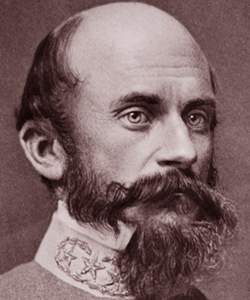Richard Stoddert Ewell (American National Biography)
Scholarship
When the Mexican War ended, Ewell was assigned to frontier duty in the West. Between 1850 and 1860 he served at posts in New Mexico and Arizona, including Rayado (1850-1851), Los Lunas (1851-1856), and Fort Buchanan (1857-1860). During that time, he gained a reputation as being one of the country's premier frontier officers. He stayed in the saddle for weeks at a time, pursuing Apaches who attacked Mexican settlements and providing some small measure of law and order in an otherwise lawless society. Americans, Mexicans, and Apaches alike respected him for his judgment and fairness. According to one source, he was the only officer that the Apache warrior Cochise feared.
Ewell was on leave at his family home in Virginia, recovering from a near-fatal bout of malaria, when he learned that the state had seceded from the Union. Although opposed to secession, he promptly resigned from the U.S. Army and accepted a lieutenant colonel's commission in the Confederate army. On 1 June 1861 U.S. troops attacked his command at Fairfax Court House. Ewell was slightly wounded in the skirmish, making him perhaps the first southern field-grade officer to be wounded in the war. Perhaps in part because of his injury, he was promoted to brigadier general on 17 June.
Ewell was on leave at his family home in Virginia, recovering from a near-fatal bout of malaria, when he learned that the state had seceded from the Union. Although opposed to secession, he promptly resigned from the U.S. Army and accepted a lieutenant colonel's commission in the Confederate army. On 1 June 1861 U.S. troops attacked his command at Fairfax Court House. Ewell was slightly wounded in the skirmish, making him perhaps the first southern field-grade officer to be wounded in the war. Perhaps in part because of his injury, he was promoted to brigadier general on 17 June.
Donald C. Pfanz, "Ewell, Richard Stoddert," American National Biography Online, February 2000, http://www.anb.org/articles/04/04-00353.html.




